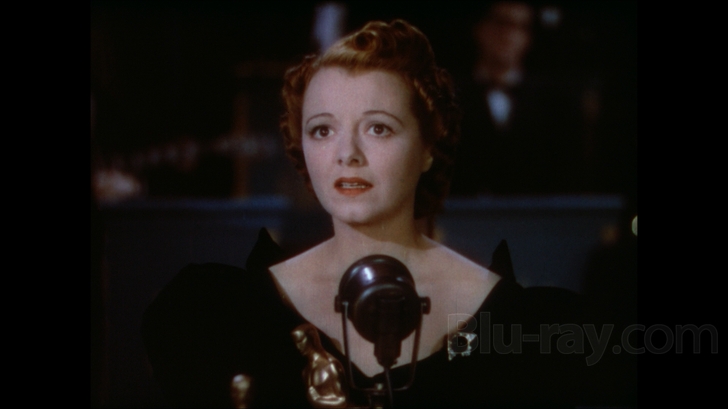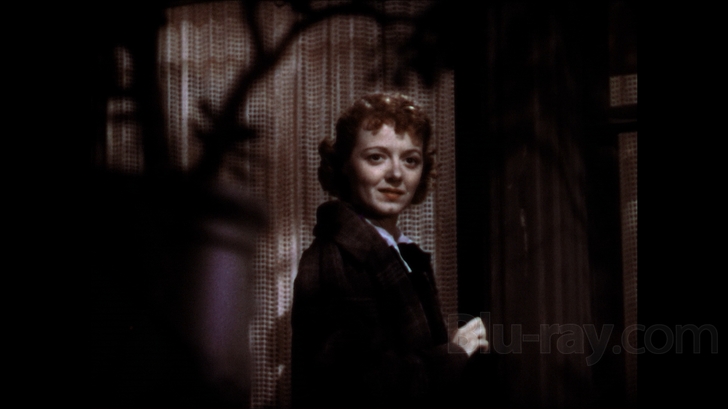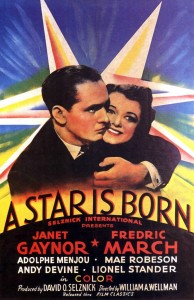|
Genres, Themes, Actors, and Directors:
- Adolph Menjou Films
- Alcoholism and Drug Addiction
- Aspiring Stars
- Fredric March Films
- Hollywood
- Janet Gaynor Films
- Rise-and-Fall
- Romance
- Star-Crossed Lovers
- William Wellman Films
Response to Peary’s Review:
Peary writes that this “William Wellman classic” — an earlier version of George Cukor’s celebrated 1954 musical starring James Mason and Judy Garland — is a “rare case” when the original “stands up to the remake”. It’s been well-noted that both versions ironically feature a reversal of stances, with Gaynor and Garland actually near the end of their real-life careers, and March and Mason near the peak of theirs. To that end, Peary writes that this film “appropriately capped Gaynor’s brief but impressive career”, and that “because Gaynor’s playing her, we can believe the sweetness, selflessness, and inner strength that characterize Esther/Vicki”. He adds that “March is surprisingly and effectively subdued in a role in which other actors (i.e., John Barrymore) might have chewed up the scenery”.
I’m in agreement with Peary’s review. While the remake is undeniably more masterful on every level — with Mason and Garland giving Oscar-worthy, gut-wrenching performances — this earlier version is enjoyable, well-acted, and affecting. In his Alternate Oscars, Peary writes that while “we are told Janet Gaynor’s Esther-Vicki has talent in the 1937 film, Garland proves her star talent” — and yes, it’s less obvious that Gaynor’s Esther/Vicki “deserves” the fame she wins through her lucky break. But this is essentially a melodramatic fable, so the reversal of fortunes experienced by March and Gaynor comes across as almost archetypal in its swiftness and simplicity. The star-crossed lovers’ romance feels both genuine and doomed.
Redeeming Qualities and Moments:
- Fredric March as Norman Maine

- Janet Gaynor as Esther Blodgett/Vicki Lester (nominated as one of the Best Actresses of the Year in Alternate Oscars)

- Fine Technicolor cinematography

Must See?
Yes, as a classic melodrama, and for its status as an Oscar winner (for original story, with script written in part by Dorothy Parker). Nominated as one of the Best Pictures of the Year by Peary in his Alternate Oscars.
Categories
- Genuine Classic
- Oscar Winner or Nominee
Links:
|




One thought on “Star is Born, A (1937)”
Not must-see.
On rewatching this after many years, I was struck hard by just how relentlessly corny it is. Melodrama is one thing – but this thing creaks from being overly sappy.
So, while the effect is not really the fault of the actors, they aren’t helped any by what they are given to say, overall. A lot of what is said in this version just doesn’t play well anymore (if it did then).
One of the most interesting things about the 1954 remake is that it does take what works in the 1937 script – and fashions it into (and pads it with) something that’s tougher, more believable, and much more compelling.
Of course, there’s one major element of the remake that makes this earlier version simply unnecessary: Judy Garland.
It seems to me a significant error in this earlier film that we *never* see any evidence of what makes Vicki Lester worthy of being such a huge star. Of course, it’s more believable and effective for the story if Norman Maine falls in love with a woman *and* her talent (as he does in the 1954 remake). But in this first version, Norman falls in love with Vicki because she catches his eye as a cutie, period – and he tries to get her promoted big-time at his studio *because* of that (which doesn’t make sense).
Of course, we do see a tiny sequence in which Maine and Lester star together in a film and, after the film’s preview, the audience comes out talking about Vicki – and stating how “washed-up” they feel Norman is. But that’s not really enough…at all. In the 1954 version, we get Garland – we get the hugeness of Vicki’s talent as clear evidence that she is destined for the heights of the world of cinema…and we see that evidence over and over, which then makes Norman’s fate that much sadder to witness. That is what makes for a better film – and that is what the 1954 film has unfortunately done to the 1937 one: it has made the need of it moot.
That said, there’s still some spark from some of the supporting cast: May Robson (as Gaynor’s grandmother) and Andy Devine and Lionel Stander – in the roles which would subsequently be played by Tom Noonan and Jack Carson.